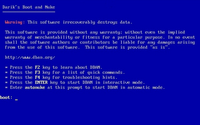-
U.S. says evidence ties North Korea to Sony cyberattack
U.S. intelligence agencies said they have concluded that the North Korean government was “centrally involved” in the attacks on Sony’s computers. This conclusion, which will likely be confirmed today (Thursday) by the Justice Department, was leaked to the media only hours after Sony, on Wednesday, canceled the Christmas release of the comedy — the only known instance of a threat by a nation-state pre-empting the release of a movie. Senior administration officials, speaking on condition of anonymity, said the White House was still debating whether publicly and officially to accuse North Korea of the cyberattack.
-
-
Sony hackers threaten attacks against movie goers who plan to see “The Interview”
The hackers who attacked Sony networks are now threatening an attack on people who plan to go to see the movie “The Interview.” The hackers write in their message that they “recommend you to keep yourself distant” from movie theaters showing the movie. The hackers earlier promised to deliver a “Christmas gift.” It was not clear what they had in mind – some suggested they would release another batch of embarrassing data from Sony’s files — but it now looks as if the “gift” might well be a cyberattack on movie theaters.
-
-
2008 Turkish oil pipeline explosion may have been Stuxnet precursor

The August 2008 Baku-Tbilisi-Ceyhan (BTC) oil pipeline explosion in Refahiye, eastern Turkey, was ruled at the time to be an accident resulting from a mechanical failure, which itself was a result of an oversight by Turkish government’s supervisors. Western intelligence services concluded that the explosion was the result of a cyberattack. According to people familiar with an investigation of the incident, hackers had infiltrate the pipeline’s surveillance systems and valve stations, and super-pressurized the crude oil in the pipeline, causing the explosion.
-
-
FBI moves cyberthreats to top of law-enforcement agenda
FBI director James Comey said combatting cybercrime and other cyber threats are now top FBI priority. “It (the Internet) is transforming human relationships in ways we’ve never seen in human history before,” Comey said. “I see a whole lot of hacktivists, I see a whole lot of international criminal gangs, very sophisticated thieves,” he added. “I see people hurting kids, tons of pedophiles, an explosion of child pornography.” In October Comey urged Congress to require tech companies to put “backdoors” in apps and operating systems. Such a move would allow law enforcement officials to better to monitor suspected criminals who often escape the law using encryption and anti-surveillance computer software.
-
-
Cyber whodunnit: North Korea prime suspect but there are many potential culprits
Many suspect North Korea to be behind the attack on Sony Pictures. North Korea quite possibly has motive, means, and opportunity to carry out this attack on Sony, but as with any successful prosecution, that isn’t enough. We need evidence. We will have to wait for the detailed forensic work to complete before we stand a realistic chance of knowing for certain. That may or may not be forthcoming, but in the meantime we should consider what this event tells us about the balance of power in cyberspace. In a world in which major disruption can be caused with scant resources and little skill, all enemies are a threat. North Korea might be the rogue state that everyone loves to hate but there are plenty of others who could have done it. There is no longer a tiered approach of superpowers fighting proxy wars in smaller, developing nations. Now those developing nations can fight back, and you might not even know it was them.
-
-
Quantum physics makes fraud-proof credit cards possible
Credit card fraud and identify theft are serious problems for consumers and industries. Corporations and individuals work to improve safeguards, but it has become increasingly difficult to protect financial data and personal information from criminal activity. Fortunately, new insights into quantum physics may soon offer a solution, as a team of researchers has harnessed the power of quantum mechanics to create a fraud-proof method for authenticating a physical “key” which is virtually impossible to thwart.
-
-
Can a hacker stop your car or your heart? Security and the Internet of Things
An ever-increasing number of our consumer electronics is Internet-connected. We’re living at the dawn of the age of the Internet of Things. Appliances ranging from light switches and door locks, to cars and medical devices boast connectivity in addition to basic functionality. The convenience can’t be beat, but the security and privacy implications cannot and should not be ignored. There needs to be a concerted effort to improve security of future devices. Researchers, manufacturers and end users need to be aware that privacy, health and safety can be compromised by increased connectivity. Benefits in convenience must be balanced with security and privacy costs as the Internet of Things continues to infiltrate our personal spaces.
-
-
FIDO 1.0 specifications published aiming to promote stronger authentication
The FIDO (Fast IDentity Online) Alliance, an open industry consortium promoting standards for simpler, stronger authentication, the other day published final 1.0 drafts of its two specifications — Universal Authentication Framework (UAF) and Universal 2nd Factor (U2F).
-
-
McAfee Labs report previews 2015 cyber threats, exploits, evasions
McAfee Labs November 2014 Threats Report offers an analysis of threat activity in the third quarter of 2014, and the organization’s annual 2015 Threats Predictions for the coming year. The report details a third quarter filled with threat development milestones and cyber events exploiting long-established Internet trust standards. McAfee Labs forecasts a 2015 threat landscape shaped by more attacks exploiting these standards, new attack surfaces in mobile and Internet of Things (IoT), and increasingly sophisticated cyber espionage capabilities, including techniques capable of evading sandboxing detection technologies.
-
-
Improving defense of the U.S. cyber infrastructure
Florida Institute of Technology Associate Professor Marco Carvalho has been awarded a $730,000, two-year contract by DHS Science and Technology Directorate (S&T) to design a cyberdefense framework that will allow multiple organizations in both civilian and government sectors unprecedented levels of coordination in their efforts to protect the nation’s cyber infrastructure.
-
-
Coordinated cyberattacks by Iran-based hackers on global critical infrastructure
Irvine, California-based cybersecurity firm Cylance last week released a report detailing coordinated attacks by hackers with ties to Iran on more than fifty targets in sixteen countries around the globe. Victim organizations were found in a variety of critical industries, with most attacks on airlines and airports, energy, oil and gas, telecommunications companies, government agencies and universities.
-
-
Growing cybersecurity threats offer opportunities for cybersecurity businesses
A 2013 report from the U.S. Computer Emergency Readiness Team(US-CERT) noted that the number of cyberattacks reported by federal agencies had skyrocketed 782 percent since 2006, to nearly 49,000, in 2012. Today, the figure is much higher. The increasing threat of cyberattacks from domestic and foreign actors has opened up opportunities for cybersecurity professionals, many of whom held positions with the U.S. military or intelligence agencies. For the private sector, cybersecurity spending is expected to reach $71.1 billion this year, and expected to grow about 9 percent annually through 2016.
-
-
DOJ’s new cyber unit to provide legal guidance on electronic surveillance
The Justice Department is creating a cybersecurity unit within its Computer Crime & Intellectual Property Section (CCIPS) to provide legal guidance on electronic surveillance investigations.The unit will also work with Congress on cybersecurity legislation and focus on cybercrime prevention.
-
-
China says U.S. does not appreciate China’s own vulnerability to cyberattacks
At the seventh annual China-U.S. Internet Industry Forum held on 2-3 December, Lu Wei, minister of China’s Cyberspace Affairs Administration, which manages Internet information in China, urged U.S. officials and the private sector to stop claiming Chinese cyberespionage against U.S. systems and instead understand China’s Internet information policies. China has become the world’s largest Internet market with over four million websites, 600 million Web users, and four of the world’s top ten Internet firms.
-
-
FBI cautions U.S. firms of hackers trying to overwrite companies’ data files

On Monday, several cybersecurity officers of U.S. businesses received a five-page “flash” warning from the FBI to be cautious of hackers that may use malware to override all data on hard drives of computers, including the master boot record, which prevents them from booting up. “The overwriting of the data files will make it extremely difficult and costly, if not impossible, to recover the data using standard forensic methods,” the warning read.
-
More headlines
The long view
Ransomware Attacks: Death Threats, Endangered Patients and Millions of Dollars in Damages
A ransomware attack on Change Healthcare, a company that processes 15 billion health care transactions annually and deals with 1 in 3 patient records in the United States, is continuing to cause massive disruptions nearly three weeks later. The incident, which started on February 21, has been called the “most significant cyberattack on the U.S. health care system” by the American Hospital Association. It is just the latest example of an increasing trend.
Chinese Government Hackers Targeted Critics of China, U.S. Businesses and Politicians
An indictment was unsealed Monday charging seven nationals of the People’s Republic of China (PRC) with conspiracy to commit computer intrusions and conspiracy to commit wire fraud for their involvement in a PRC-based hacking group that spent approximately 14 years targeting U.S. and foreign critics, businesses, and political officials in furtherance of the PRC’s economic espionage and foreign intelligence objectives.
Autonomous Vehicle Technology Vulnerable to Road Object Spoofing and Vanishing Attacks
Researchers have demonstrated the potentially hazardous vulnerabilities associated with the technology called LiDAR, or Light Detection and Ranging, many autonomous vehicles use to navigate streets, roads and highways. The researchers have shown how to use lasers to fool LiDAR into “seeing” objects that are not present and missing those that are – deficiencies that can cause unwarranted and unsafe braking or collisions.
